Creativity Corner
Where we learn about the powerful intersection of creativity and healing.
Spotlight: L. Kris Gowen, PhD
My obsession with the intersection of creativity and healing continues to grow. The more people I speak to about creativity’s positive impact on them the more convinced I become of its profound necessity in daily life.
Kris and I went to high school together, but lost touch afterwards. Writing, known in another word as creativity, was the impetus for us to reunite, and I’m thrilled about it because she has important lessons for us about grief and joy. Kris is the Director, Monitoring, Evaluation, and Learning at CAMPFIRE CIRCLE. CAMPFIRE CIRCLE provides year-round programming for children diagnosed with cancer and their families throughout Ontario, Canada. Her primary role is to evaluate programming, and she also is a lead in their Diversity, Equity, and Inclusion efforts.
Tracey: Several years ago, we reconnected in part due to the fact that you were writing your first book. Can you share the story behind One Nation Under Song: My Karaoke Journey Through Grief, Joy, and America? (LOVE the title by the way!)
I love how we reconnected through writing! We really lost touch since we knew each other in high school. My favourite memory of us is when we went to Germany together. I mean, how amazing is that? I still have pictures. (Me too!)
One Nation Under Song is about my trip across America where I sang karaoke in all 50 states to help me grieve the loss of my best friend who died of cancer WAY too early. I drove over 17,000 miles in 99 days to hit the lower 48 and then sang in Alaska and Hawaii later to complete the journey.
Thanks for the title love. The working title was MelOdyssey; a good friend came up with that. I thought it was super clever but the publishing company I was working with said it was too obscure.
Tracey: I’m so sorry about Molly’s death. What a gift you gave us by sharing about your journey. The book’s summary includes this: “Each time Kris took the microphone, she shed a little more grief, stepping into a world where everyone was accepted simply for singing a song they loved.” My question has two parts. Can you reflect on how your karaoke journey–the creativity involved in both the journeying and the singing–helped you process grief around death?
Molly died in 2016 and I still miss her every day. I think this road trip was the perfect way for me to grieve. Each day had a purpose; in order to complete my mission, I had a destination I needed to reach. Having a small goal every day gave me a reason to get out of bed and live. Planning the trip – which I did in stages – gave my mind something to focus on. The route I took didn’t matter as long as I got to where I needed to go so I tried to take as many smaller state highways as I could, as opposed to freeways. I often drove without the radio. I would just take in what I saw, and really experience where I was which I don’t think you can do when you take an interstate – when you are on such a large road, it feels like you could be anywhere.
I let my thoughts and feelings go where they needed to go. I accepted all emotions and the driving really opened up my mind to so many things from thinking about how people in really rural areas got their food to all the things that make the karaoke community so special. The car provided a safe space for me to grieve Molly.
The singing helped because it’s my perfect outlet to express and feel true joy. It’s so hard to describe that feeling of being where you are supposed to be – I hope many reading this understand what I mean, though. It’s sort of like Csikszentmihalyi’s “flow” – the state of being you are in when you are doing something and nothing else matters. While singing a song isn’t a long time, it is a precious few minutes where I am truly living in the moment. I love that. I can sing whatever song is in my heart, and share whatever emotions I am feeling at the moment.
And second, how the process of writing further alchemized your lived experience? In other words, how the creative act helped the healing process?
When I got back from California, the last of my Lower 48, my goal felt incomplete, and not just because I hadn’t sung in Alaska and Hawaii yet. It’s like I HAD to write the book. I had kept a blog along my journey and so I took a lot of that and shaped it into a more cohesive story. I reflected on all the experiences I had and revisited joyous and really tough times. The writing layer gave me another opportunity to honour my emotions and check in with myself to see how I was doing.
Tracey: Your second book is now available. Congratulations! It’s called, Find Your Song: Cultivating Your Pathway to Joy in Grief. Can you tell us about your decision to write a second book? Clearly, you had more to say about grief and joy.
I’m not sure if there is a “decision” to write a book. I know intellectually that yes, I one day sat down and said “I will write a book about the intersection of grief and joy,” but it didn’t feel like that. I can’t pinpoint a particular day – it was more that at some point I started researching the two emotions and then that research synthesized into my own ideas and then the words just started coming. It was the start of the pandemic, and I was feeling a different sort of grief. This book provided me with an outlet to reflect on my feelings.
Tracey: Joy is a connective tissue in your writing. Can you expand on that?
Experiencing joy – and being deliberate about it – is essential to my mental wellbeing, I am susceptible to depression and live with anxiety. It’s important that I check in with myself and do things to support my mental health. Knowing the small things that bring a smile to your face can really help during shitty times.
When Molly died, I knew I could still find joy in traveling and singing, even though some days it was really difficult to do either. When COVID took those two things away from me, I knew that writing could still bring me joy. Feeling joy when life is horrible is not the same as denying your feelings. In fact, experiencing joy allows your body and soul to rest so it can revisit the tougher feelings again. It allows you to honour your whole self. (Gosh, I love that…that joy allows us to rest and to honor ourselves. What a beautiful way to think about it.)
Tracey: I ask this question a lot because answers are varied and important: A word that comes up around creativity is “cope.” Can you talk more specifically about how, exactly, creative outlets helped you cope?
As I mentioned before, I have some mental health challenges that can really get the better of me. Being creative – whether it’s by singing or writing – helps me rest my over-active and critical brain so I can live another day. If I’m struggling, I can “sing it out” and feel so much better. If my brain is on over-drive, writing can help me focus on something else. Immersing myself in either of these forms of expression helps me cope when my brain is, frankly, being an asshole to me. (Thank you so much for sharing about how creativity helps your mental health, especially when your brain is being an asshole, lol. As you know, this topic is my passion. I just want to reiterate here that EVERYONE has mental health and we have to care for it.)
Tracey: Can you share about what the intersection of creativity and authenticity looks and feels like to you? I ask because on my healing journey creativity was the path to authentic living, which I needed to experience more joy.
Being creative allows me to be me. Singing songs that matter to me, that I can feel deep in my bones and heart, is such an amazing experience. It can be scary at times and it’s still worth it. I’m still working on bringing my authentic self to my public singing; I have competed in a few international karaoke competitions and let’s just say I’m not exactly doing well in those. It’s hard when you feel like you’ve expressed yourself sincerely and people respond negatively.
Along similar lines, it’s why I’ve chosen to publish my books more independently. I have a couple of books that I wrote with a more traditional press, and that was not a great experience because the editors took away pieces of my writing that were very important to me. Finding an editor or coach that helps you make your creativity more authentically you is a true gift. I have an amazing editor now that allows me to express what I want to. I have a vocal coach who I love dearly that always encourages me to sing songs that reflect who I am, not who I think others want me to be. It’s a powerful experience that I don’t think I’ve really figured out yet. I hope to get there some day.
Tracey: I’m a proponent of talking about self-care as a two-way street, meaning from the outside in but also from the inside out. Can you talk about how creative expression has impacted your relationship with yourself? In other words, how the process of creative expression is self-care?
When I create, I am constantly learning new things about myself and I love that. Even doing this interview is sparking new thoughts! At the risk of repeating myself, both singing and writing can be emotional outlets for me and that is an essential component of my self-care. They also provide me with the “flow” I need to distract me from an over-active brain that can spiral into a lot of negative self-talk.
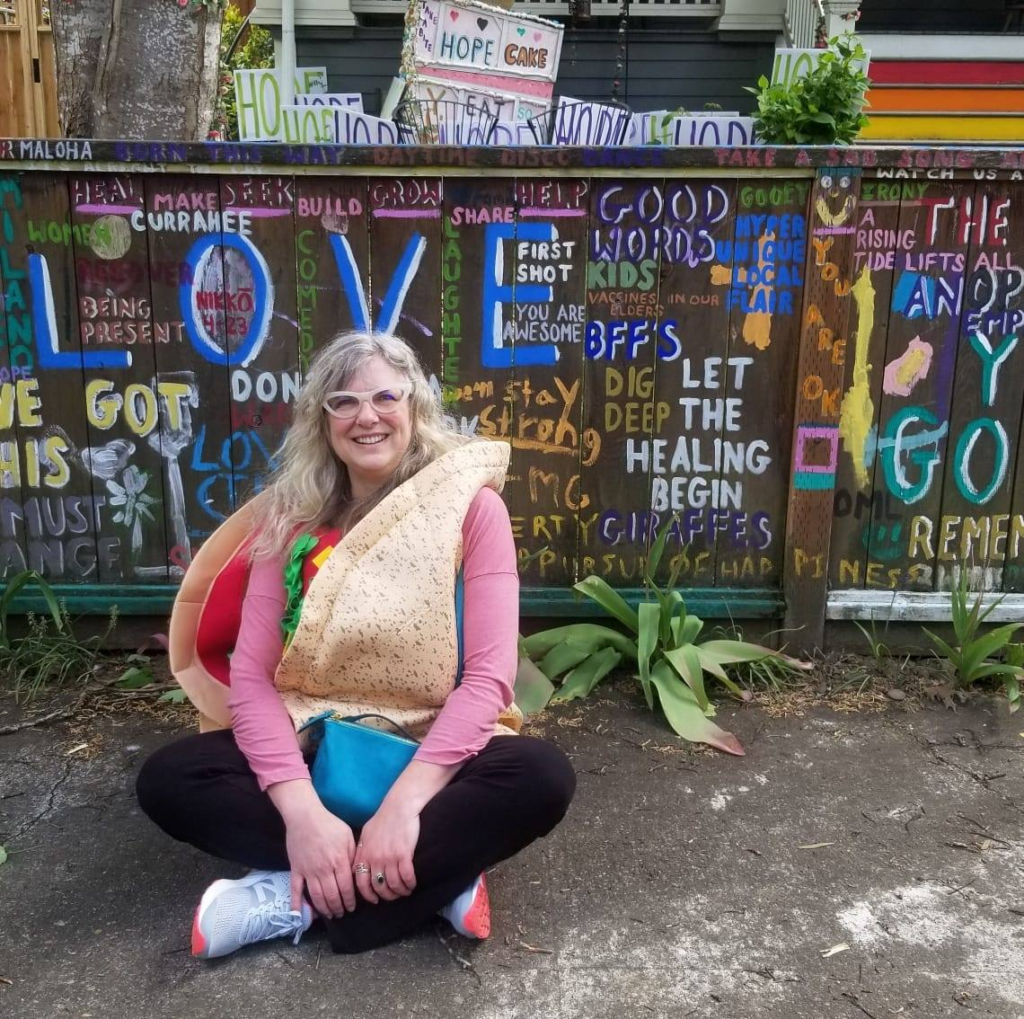
Tracey: Mark Nepo writes in his book drinking from the river of light, “When we lose access to our creativity, we lose access to wonder.” Does it resonate for you that healing through creativity helped you access more of life’s wonder? How so?
I love this! In a way, I think creativity begets wonder and wonder begets creativity. For me, driving around the country and singing exposed me to so much “new” and that got me excited to sing. Then, singing got me excited to get back into my car and drive to a new place. At each destination, I sort of knew what to expect in that I knew I was going to enter an establishment, put a song in, and take the microphone when it was my turn. The rest of it was a surprise! I didn’t know how the other people there would react. I didn’t know what others were going to sing. I didn’t know how I was going to feel when I heard new voices. Then, when I got back to the hotel for the night I was excited to write about what I experienced! Going to karaoke is such an amazing experience for me and I’m grateful I found such a silly yet profound creative outlet. That is a wonder in and of itself.
Have questions for Kris about creativity, joy, or song?
She’s willing to be contacted here: drlkrisg@gmail.com
You can meet Kris’s vocal coach, Katti Power of Sing Without Limits, HERE.
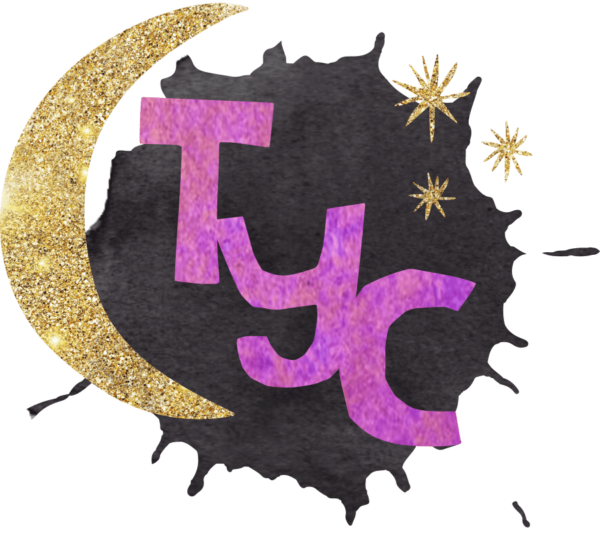
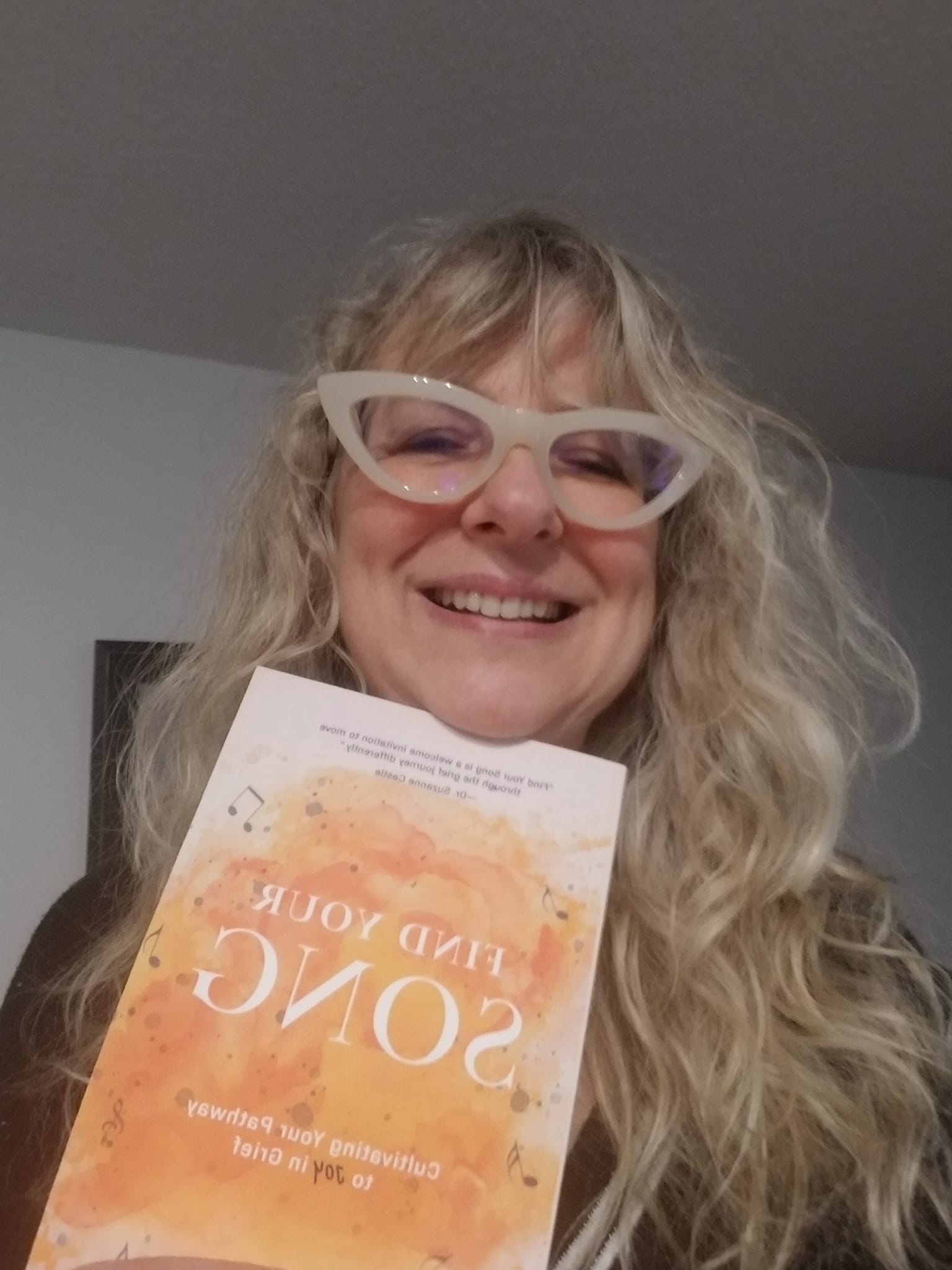
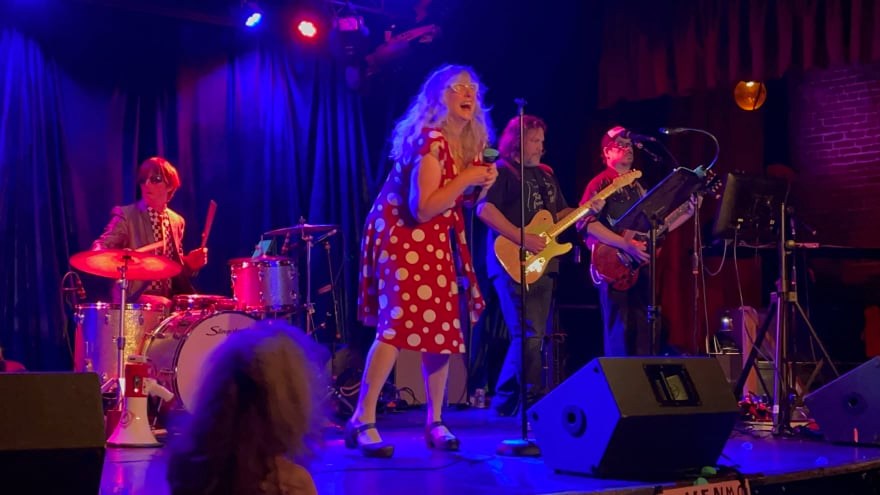
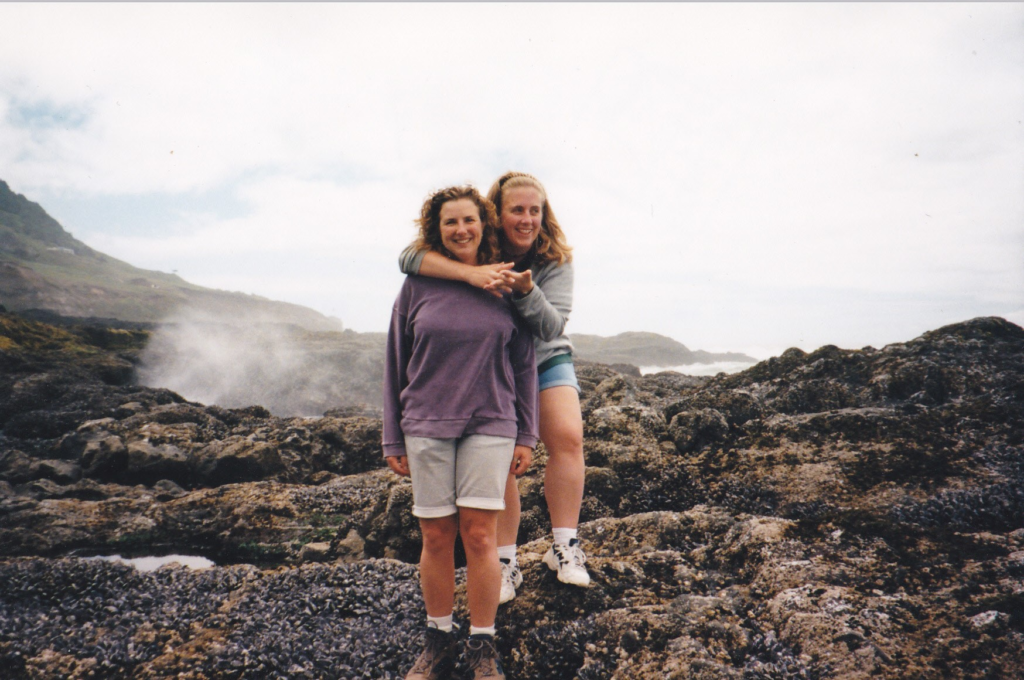
I love this post! A lot of what Kris says about grief and creativity resonates with me. Creating art (mixed-media), alone and with friends, helped me work through my grief after my husband’s death. Creativity was integral for finding joy and that was crucial to my mental health.